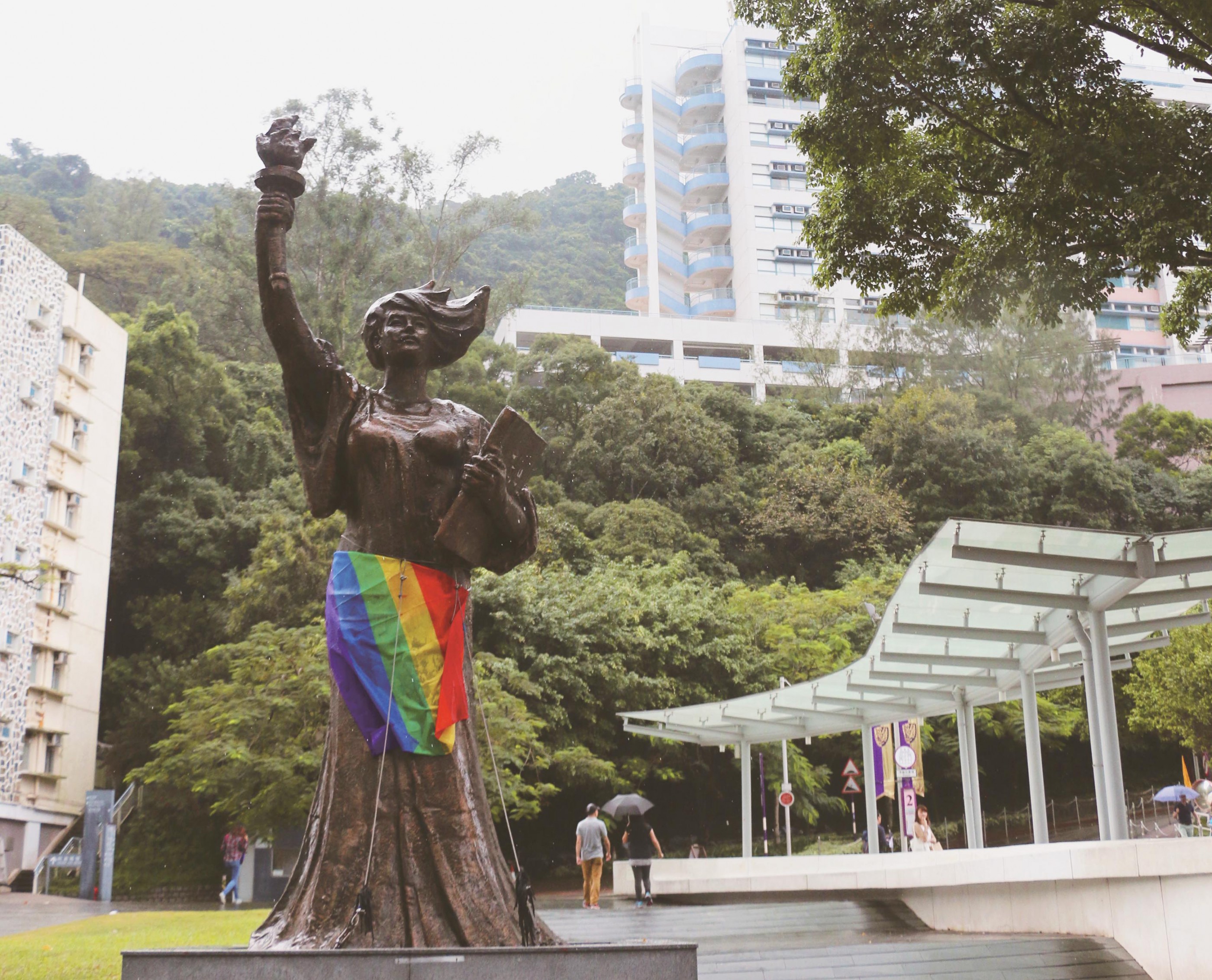Women talk about gender in protests and politics in Hong Kong
By Emily Man & Julian Ng
On the morning of Sunday April 14, 2013, university student Sun Yi-chung stood in line with other tertiary students and began a 12-hour march from the Cheung Kong Holdings headquarters in Central to Container Terminal Number Six in Kwai Chung. They were marching to support dock workers who were striking for better pay and conditions.
Sun wore a white T-shirt, a red headband and jeans. She says her outfit that day was chosen to match the others and also for comfort and convenience. This was the reason she also wore a cross-body bag that would end up attracting ridicule and harassment from strangers on the internet.
When photos of the march were circulated online, some netizens combined pictures that emphasised the then 19-year-old Sun’s breasts with sexy young models. Added captions explained how female bodies were used for promotional purposes in commercials and claimed they were used for similar purposes in social movements. The picture quickly went viral.
“I was really angry because they misunderstood me and the movement, as if I was trying to achieve something by showing off my body,” Sun says. “But I never thought of it that way.”
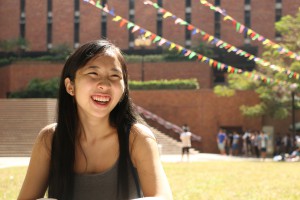
A friend of Sun’s deactivated her Facebook account to protect her but she reactivated it after less than a day. She decided she should fight back and defend herself. Sun thinks people often judge female protesters by their appearance, by what they wear and how they look and this is unfair. After the incident, Sun’s friends and family members advised her not to wear skirts or cross-body bags while attending protests, especially if cameras were present. But she insisted on choosing clothes for comfort and convenience. “I have the freedom to choose what to wear,” Sun says. “And if people comment on my body again, I will just ignore them.”
A year after Sun was body shamed, it was Shek Pui-yin’s turn to be vilified for her body. The 21-year-old was a vice-chairperson of the Representative Council of the Hong Kong Federation of Students (HKFS) at the time of the Occupy Movement.
She had been one of the HKFS spokespeople earlier in the movement, but stepped back after Chin Wan-kan, an assistant professor at Lingnan University, reposted a photo of her on stage with the caption “the action really escalated” on his Facebook page.
The Chinese term for escalate is pronounced “sing cup” in Cantonese, which can be interpreted to refer to the size of a woman’s breasts, or “cup” size. Chin denied any sexual innuendo in his choice of words. But many lewd and suggestive comments were posted by others beneath his post.
“When it happened, I wished that I were a boy,” Shek says. “If you think what I said was nonsense, you can criticise me directly instead of criticising my body…it is not fair that females participating in politics always need to deal with these kind of attacks.”

Shek was unsure of how to react to the comments at first, but later criticised Chin for being disrespectful. She suggested he was using sexual violence as a tactic to scare away female protesters who held different political views to his. This only brought her more criticism.
Chin’s supporters attacked Shek and accused her of being an attention-seeking radical feminist. But Shek does not regret speaking out.
“If I had not replied, those people would use the same strategy to attack other girls. I felt I needed to stand up and let them know I did not like it,” she says.
Apart from being criticised for their appearance, Shek says women are marginalised in Hong Kong politics, where men dominate and women often just take supporting roles. She says even in social movements, the culture expects leaders to be masculine and to speak boldly. Men often occupy roles like secretary-general, and women generally provide back-up and support.
“This limits my participation. I think I am also capable of speaking publicly, and I also have my own thoughts. Why can’t I be involved in decision-making? Why can’t I speak on stage? Why do I have to retreat and not stand on the frontline?”
However, Shek’s boyfriend, 22-year-old Chan Man-wai, who has participated in different protests and social movements, has a slightly different take. He acknowledges that division of labour along gender lines is commonly seen in social movements but he believes men are usually assigned to the frontline while women are assigned to do more back-up work for the sake of efficiency.
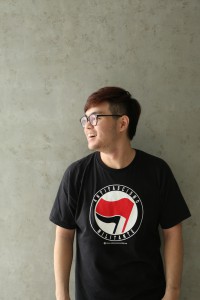
He also thinks asking women to retreat from the frontline is a practical consideration rather than a gender issue.
“In the Occupy Movement, I saw a girl standing in the frontline but she had very little equipment to protect herself. I was worried about her safety and asked her to step behind for a while,” says Chan.
Reports of sexual assault and harassment from anti-Occupy groups were reported during the occupation of Mong Kok, and quips such as, “If you come out to protest, you should expect to be groped!” were widely heard. Chan says that in such circumstances he sometimes felt a need to protect female protesters. Sometimes he would put himself between female protesters and policemen. However, he agrees that women should also be able to take more radical action and adds that he did not ask anyone to leave Mong Kok at the time.
As for criticisms and insults based on female protesters’ bodies and appearance, Chan notes it exists on both sides of the political divide. For instance, the convener of the pro-government Justice Alliance, Leticia Lee See-yin is frequently the target of sexual insults online. For some who disagree with her views, attacking her looks seems to be fair game.
Chan counts many of his friends among those who insult Lee in this way but he disapproves of such behaviour.
“I do not know whether criticising her for being fat and ugly is a way to express disagreement towards her political stance or if it is the truth. But for me, these criticisms are not right,” says Chan.
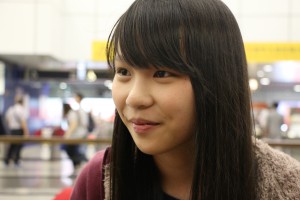
Not all women in the public eye see criticism of females in the public and political spheres as being gender-based attacks. Agnes Chow Ting, former spokesperson of student activist group Scholarism, says: “It is not a sexual attack because if I were a boy, the only difference would be the words that they use…it is all about political stance. They don’t have the same political stance as you, and they simply want to insult you.”
Chow’s public nicknames, such as “BB” and “goddess” are flattering compared to those for some other women in politics. But she questions whether these labels should be used at all, whether for men or women in the public sphere.
For Civic Party Vice-chairman Tanya Chan Suk-chong, such labels go with the territory because politics is all about perception. “It’s not just women, people also focus on the appearance and image of men, label them as ‘gods’,” says Chan.
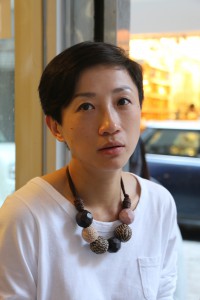
Chan, one of two women who symbolically shaved their heads in support of the Occupy Movement last year, believes it is normal for people to discuss female politicians’ appearance and the media find it an easy target. But she thinks once a female politician has political achievements under her belt, the discussion about her looks will stop.
“People can only talk about your body, make-up, hairstyle and marriage if you have nothing else to be discussed. But when you have some achievements, people will talk about something else,” says Chan.
Feminist scholar Luk Kit-ling, chairperson of the Association for the Advancement of Feminism, believes the attacks on women in protests are both political and gendered.
“It is political in the sense that the attack is to scare and deter people’s participation. It is gendered because it uses sexual violence and sexual harassment to rule out women in their civic participation.”
Luk believes sexual attacks always adhere to the dominant ideology of society at large, whether the attacks are on women or on men.
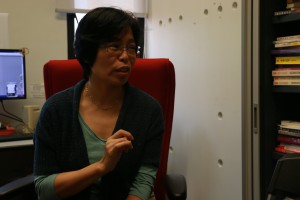
“Women attract more attacks in the public arena as they are assumed to be domestic and belong to the private domain,” Luk explains, adding that the attacks on women suggest that the female body is a passive object and that women live their lives as objects for another’s gaze.
Luk says negative comments help construct a view of the female body as something vulnerable, as a source of horror and shame rather than as a source of pleasure, fertility and empowerment.
Even positive comments, such as calling a female protester a “goddess” impose certain standards and expectations of femininity on all women.
“It is important to diversify femininities and to liberate people from their gender boundaries, even for men,” she adds. “Sayings such as ‘real men should be defending Mong Kok’ also address gender boundaries that are supported by the patriarchal society.”
While there is still debate on whether sexual slurs against women in politics and at protests is gender discrimination or just a political issue, there is little argument that sexual harassment of women in protests is really sexual harassment. However, there are no laws to protect women’s rights in protests and in politics.
Ivan Luk Chi-cheung, chief legal counsel for the Equal Opportunities Commission (EOC), says there is inadequate protection for women at protests as the current regulations only cover sexual harassment in certain fields, such as employment, education and the provision of goods and services.
Luk explains the law only covers physical assaults, not verbal sex attacks in social movements or on the streets. He agrees the scope of the law should be expanded as he has noticed the sexual harassment of women protesters has increased in recent years.
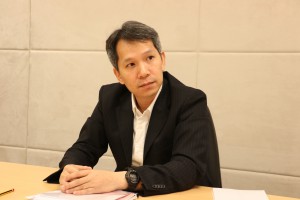
The EOC conducted a review of Hong Kong’s anti-discrimination legislation last year, and protecting women in protests was one of the things discussed. However, Luk says it was not included in the final consultation document. “We suggested expanding the scope of protection from sexual harassment, but it should be done step by step. If we suddenly expand it from harassment in employment to [harassment from] strangers, it may not be realistic in a short period of time,” says Luk.
In the meantime, he believes education is necessary to change the culture that allows harassment to flourish. Here he finds agreement from Luk Kit-ling (not a relation), who also notes this is easier said than done. “Sometimes it is quite discouraging, but the female liberation movement will not end. We have to continuously change the old ideas because conservative forces are always more powerful than us,” she says.
Edited by Angel Liu









































